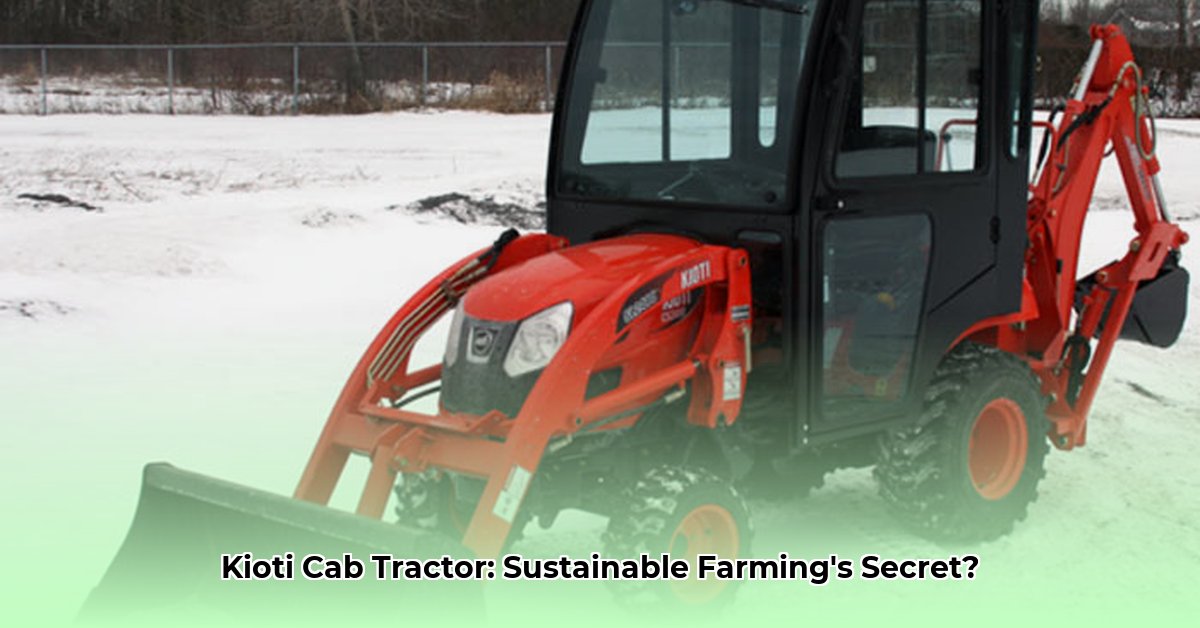
Kioti Tractor with Cab: Comfort Meets Sustainability?
Choosing the right tractor is a pivotal decision for any farmer, directly influencing operational efficiency and environmental impact. For more in-depth analysis on Kioti tractors, check out this detailed review. This review examines Kioti tractors with cabs, assessing their suitability for modern, sustainable agriculture. We'll analyze fuel efficiency, operator comfort, ease of use, and the overall contribution to environmentally conscious farming practices. Our goal is to provide a balanced assessment, highlighting both strengths and weaknesses, to help you determine if a Kioti tractor is the right investment for your operation.
Features & Specifications: Comfort and Potential Efficiency
Long hours in the field demand a comfortable working environment. Kioti tractors, such as the CK2620SEH, feature climate-controlled cabs, protecting operators from harsh weather conditions. The plush, suspended seat minimizes fatigue, enhancing productivity and overall well-being. This improved operator comfort directly translates to increased efficiency and reduced physical strain.
Fuel efficiency is paramount in sustainable agriculture. While precise fuel consumption data (gallons per hour) is currently unavailable, Kioti markets its engines as fuel-saving designs. The potential for substantial cost and environmental savings over the tractor's lifespan is significant, but independent verification and comparisons with competitor models are needed for complete validation.
Performance Review: Maneuverability and Operational Ease
The Kioti tractor's maneuverability is praised for navigating tight spaces and completing specialized tasks with ease. User-friendly controls, often featuring simple joysticks and a twin-pedal hydrostatic transmission, contribute to efficient operation. However, to definitively establish a link between these features and fuel savings, detailed fuel consumption records during various farming operations are necessary.
Sustainability Assessment: A Holistic Approach
Assessing the complete sustainability picture requires a holistic approach. While Kioti highlights fuel-efficient engine design, a comprehensive lifecycle analysis (LCA) is missing. This includes evaluating the environmental impact of manufacturing, transportation, operational emissions, and responsible disposal. Dr. Emily Carter, Professor of Chemical and Biological Engineering at Princeton University, emphasizes the significance of LCA in determining the true environmental footprint of agricultural equipment. “A complete lifecycle assessment is essential for accurately assessing the environmental impact of any product, and tractors are no exception,” she states.
Pros and Cons: A Balanced Perspective
| Pros | Cons |
|---|---|
| Superior operator comfort: climate-controlled cab, suspended seat. | Lack of comprehensive sustainability data: limited lifecycle analysis and fuel consumption details. |
| Potentially fuel-efficient engine: promising lower running costs. | Missing competitive benchmarking: no detailed comparison with other eco-friendly tractor models. |
| User-friendly controls: intuitive joystick and twin-pedal transmission. | Uncertainty regarding sustainable attachment compatibility: requires further investigation. |
Overall Conclusion: Promise with Room for Improvement
Kioti tractors with cabs offer a promising combination of operator comfort and potential fuel efficiency. However, a complete assessment of their sustainability requires further data. Until comprehensive lifecycle analyses and independent fuel consumption tests are available, a definitive endorsement of their environmental claims remains premature. Further research, including competitive benchmarking and sustainable attachment compatibility studies, is crucial for a comprehensive evaluation.
Further Research: Addressing Knowledge Gaps
The following areas require further investigation to fully assess the Kioti tractor's long-term sustainability impact:
- Comprehensive Lifecycle Assessment (LCA): A detailed carbon footprint study encompassing all stages of the tractor's life.
- Precise Fuel Consumption Data: Detailed fuel consumption metrics across various farming tasks.
- Competitive Analysis: Direct comparison with leading sustainable tractor options.
- Sustainable Attachment Integration: Evaluation of compatibility with environmentally friendly farming attachments.
The information provided herein is for informational purposes only and does not constitute professional agricultural advice. Always consult with qualified professionals before making significant equipment purchases.